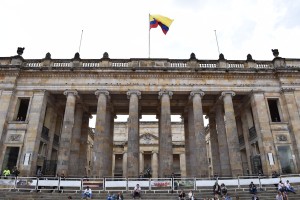 From August 8th to September 22nd 2016, the Colombian Ministry of Commerce made a public call for comments on a draft reform of the current copyright legislation. A key change that this proposal could have included was conspicuous by its absence: the parody exception. Colombian civil society has advocated for a change to this. The Foundation for Press Freedom, one of the organisations that commented on the draft, has proposed the inclusion of an exception similar to that which exists in Europe.
From August 8th to September 22nd 2016, the Colombian Ministry of Commerce made a public call for comments on a draft reform of the current copyright legislation. A key change that this proposal could have included was conspicuous by its absence: the parody exception. Colombian civil society has advocated for a change to this. The Foundation for Press Freedom, one of the organisations that commented on the draft, has proposed the inclusion of an exception similar to that which exists in Europe.
Colombian legislation does not include a parody exception for copyright. Consequently, the creation of a parody requires the authorisation of the author of the parodied work. Otherwise, those kinds of acts would constitute an infringement. There are not many parodists in Colombia, but those who do exist have gained a place in Colombian’s hearts, like the radio show ´La Luciernaga´, which has existed for more than 20 years. This show is part of the programming of one of the two main radio networks of the country and this lack of copyright exception is not an unbearable burden for them.
On the other hand, new parodists may find it difficult to succeed in Colombia. That is what happened with “Los Cantores de Chipuco”, who make parodies of famous reggaetón singers. As the parodists explained in an interview with El Tiempo in 2011, “we had to give our songs for free on the internet because we didn’t have authorisation from the discographies. Now, thanks to dialogue with them and with Sayco and Acinpro [the main Collective Rights Management Organisations in Colombia], we have licence to publish our first record” [author’s own translation].
In 2012, a group of congressmen drafted a bill proposal to include new exceptions, one of which was for the purposes of parody. The proposed exception for parody was as follows [author’s own translation]:
Article 1: Notwithstanding the limitations and exceptions established in the legislation to copyright and its neighboring rights, it will be lawful to carry out, with or without the author’s or right holder’s authorisation and without remuneration, the following acts:
(…)
- d) the transformation of published artistic or literary works, whenever it is done for the purpose of parody. The transformation must not create a risk of confusion with the original work, cause harm to the author’s moral right to integrity, cause an unjustified prejudice to the author’s legitimate interest or affect the normal exploitation of the original work.
 For the purposes of this article, parody must be understood as a funny imitation implying a mockery or a joke.
For the purposes of this article, parody must be understood as a funny imitation implying a mockery or a joke.
Furthermore, it must be noted that Article 11(c) of Andean Decision 351[1] provides for a moral integrity right in the following terms:
Article 11: The author shall have the inalienable, unattachable, imprescriptible and unrenounceable right:
(…)
- to object to any distortion, mutilation or alteration of the work that is prejudicial to the integrity thereof or to the reputation of the author.
The text of the proposed exception caused scandal. Journalists, media professionals and civil society organisations complained that this proposal would be harmful for freedom of expression. After all, the nature of parody implies that the integrity of the work will be in some way affected.
In the end, the authors of the bill proposal withdrew it. The subject has been off Colombia’s legislative agenda for more than 3 years.
In EU law, parody is granted as an exception to copyright in Article 5 (3) (k) of Directive 2001/29/EC of the European Parliament and of the Council of 22 May 2001 on the harmonisation of certain aspects of copyright and related rights in the information society (Infosoc Directive). The article is as follows:
Member States may provide for exceptions or limitations to the rights provided for in Articles 2 [reproduction] and 3 [communication to the public] in the following cases:
…
(k) use for the purpose of caricature, parody or pastiche
Moreover, Article 5 (5) provides that exceptions like the one mentioned above “shall only be applied in certain special cases which do not conflict with a normal exploitation of the work or other subject-matter and do not unreasonably prejudice the legitimate interests of the rightholder”. There is no mention of protection of moral integrity of the work.
In 2014, the European Court of Justice (ECJ) gave a preliminary ruling in Case C-201/13 (Deckmyn). The rationale behind this decision may be of use for the Colombian government and legislators.
In that case, the ECJ ruled that the essential characteristics of parody are: 1. Evoking an existing work but being noticeably different from it; and 2. Constituting an expression of humour or mockery. It is not necessary to display an original character, beyond having noticeable differences from the original work. Furthermore, the ECJ said that there must be a fair balance between the interests and rights of rights holders and the freedom of expression of the parodist.
The moral right of integrity is not expressly mentioned in Deckmyn but it may fall within the concept of interests and rights of rights holders. Nevertheless, the protection is not as categorical as in the Colombian bill proposal of 2012.
Dutch law introduced a parody exception as part of its implementation of the Infosoc Directive. The only additional wording refers to having a use “in accordance with what is generally regarded as reasonably acceptable”. The Dutch legislators saw no need to expressly include the moral right of integrity. Colombian government and legislators could perhaps take a look.
[1] Andean Decision 351 is legislation by the Andean Community of Nations (Bolivia, Colombia, Ecuador and Peru). According to the Constitutional Court of Colombia (C 1118/05), the provisions of this legislation related to moral and economic copyright are part of the body of constitutional rules and principles. The latter is based in article 93 of the Constitution, which provides that international treaties ratified by the country make part of the mentioned body.
________________________
To make sure you do not miss out on regular updates from the Kluwer Copyright Blog, please subscribe here.


